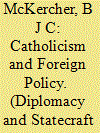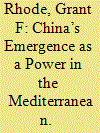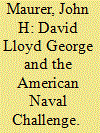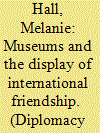|
|
|
Sort Order |
|
|
|
Items / Page
|
|
|
|
|
|
|
| Srl | Item |
| 1 |
ID:
178363


|
|
|
|
|
| Summary/Abstract |
Esme Howard, the British diplomat posted to the Paris Peace Conference to handle policy towards North and Northeastern Europe, saw his proposals except for the Polish Corridor largely ignored by David Lloyd George, the prime minister, and his advisors at Downing Street. The two men had decidedly different conceptions of post-war Poland: Howard plumped for a large Poland with adequate territory and economic resources to counter the certain revival of Britain’s adversaries Germany and Russia; Lloyd George looked for a smaller one to appease republican Germany and Russia whether the latter became ‘Red’ or ‘White’. It has been suggested that as Howard was Roman Catholic, he looked to support reborn Roman Catholic Poland as much as he could. Such assertions are incorrect. Before and after 1919 in his various postings, he always put British interests above all else, even in Catholic countries in which he served. His advice at Paris was to ensure smaller Powers like Poland and the Baltic States could with British support maintain a regional balance of power against Britain’s Berlin and Moscow. Lloyd George lacked any strategic vision in seeking to ameliorate differences with the Germans and Russians.
|
|
|
|
|
|
|
|
|
|
|
|
|
|
|
|
| 2 |
ID:
178368


|
|
|
|
|
| Summary/Abstract |
In the decade between 2009 and 2019, China emerged as an economic power with geostrategic dimensions in the Mediterranean and Southeastern Europe, a region contested by great powers for many centuries. After firmly establishing primacy in the Greek port of Piraeus, China has executed a sweeping programme of port diplomacy involving over two dozen ports along Mediterranean European, Middle Eastern, and North African shores. Concurrently, China has conducted a programme of active engagement with the Central and Eastern European Countries, resulting in the 17 + 1 association tied to its Belt and Road Initiative through the Mediterranean Piraeus gateway. Based on these developments, China is well situated to expand its power in the Mediterranean going forward.
|
|
|
|
|
|
|
|
|
|
|
|
|
|
|
|
| 3 |
ID:
178364


|
|
|
|
|
| Summary/Abstract |
The First World War spurred the United States to acquire – in the words of Woodrow Wilson – ‘incomparably the greatest navy in the world’, and amongst the many problems confronting Britain after 1919 was how to avoid an Anglo-American naval arms race. David Lloyd George was determined not to sleepwalk into another struggle for naval mastery. He rejected the expert opinion of his top naval advisers that building capital ships would enhance Britain’s security. Instead, he showed restraint in responding to the American naval build-up, while doggedly pursuing arms control talks with Washington. He thus prevented an escalation of the naval arms competition that emerged after the war, and so created the favourable conditions for a negotiated settlement of the naval rivalry with the United States and provided for Britain’s security at sea.
|
|
|
|
|
|
|
|
|
|
|
|
|
|
|
|
| 4 |
ID:
178359


|
|
|
| 5 |
ID:
178361


|
|
|
|
|
| Summary/Abstract |
It is generally recognised that towards the end of the nineteenth century the Anglo-American relationship entered a new phase characterised by friendship-building initiatives. However, as American businesses sought to expand into the British Empire’s markets, that enterprise required trust more than friendship. This article captures an overlooked aspect of Ambassador Bayard’s cultural diplomacy, one that sought to build trust for American products and services by harnessing American philanthropy notably through his and other prominent Americans’ engagement with the Carlyle House Memorial Museum in the Empire’s capital. Simultaneously, Bayard’s engagement with the museum celebrated America’s endorsement of international copyright legislation. It argues that Thomas Carlyle’s views, together with his friendship with Ralph Waldo Emerson, made the museum-making initiative particularly suited to such purposes. At Carlyle’s House, a thriving group of American ex–patriots and tourists could associate the friendship of the two authors with ‘higher’ ideals of a ‘civilisation’ held in trust.
|
|
|
|
|
|
|
|
|
|
|
|
|
|
|
|
| 6 |
ID:
178365


|
|
|
|
|
| Summary/Abstract |
This article explores the preparation made by the British government, primarily the Foreign Office, for the state visit of King George VI and Queen Elizabeth to the United States three months before the outbreak of the Second World War. It considers the dynamics of the relationship between the officials in Whitehall, the British ambassador in Washington, Sir Ronald Lindsay, the agenda of the Roosevelt administration and the role of the British royal family as ambassadors in their own right. Lindsay’s role was also pivotal because he was a personal friend of the King and was also on much respected and influential figure in Washington. The article does not discuss the course of the state visit, although there is discussion of the literature that relates to it. However, it does reveal that securing a concrete alliance with the United States was not the priority of the British government in the summer of 1939; that the focus of the Foreign Office, in particular, was on the growing diplomatic crisis in Europe. Lastly, the article argues that in the months leading up to the outbreak of the Second World War, the Foreign Office was confident in its own ability to lead the formulation of British foreign policy; that it was not eclipsed by Neville Chamberlain’s very personal involvement in appeasing the fascist dictators.
|
|
|
|
|
|
|
|
|
|
|
|
|
|
|
|
| 7 |
ID:
178362


|
|
|
|
|
| Summary/Abstract |
Sir Arthur Hirtzel, the long-serving senior official in the India Office was an old – and a much respected – Middle Eastern hand. Few in Whitehall could rival him in his capacity ‘to get into the mind of the man at the other end of the line.’ Surprisingly, perhaps, Hirtzel never visited the region and never set foot in India, with which he was so intimately connected in an official capacity. As this examination of his role during the First World War and its immediate aftermath shows, Hirtzel’s perspicacity concerning key political and military developments, as well as the opportunities and the constraints presented by the war, was striking. Notable was his percipience in predicting the import of Wilsonian idealism for Britain’s ambitions in the wider Middle Eastern region. So too was his ability to adapt policy to the changing international environment. He also foresaw the considerable difficulties, especially financial pressures, which would arise in Iraq and affect British control there.
|
|
|
|
|
|
|
|
|
|
|
|
|
|
|
|
| 8 |
ID:
178366


|
|
|
|
|
| Summary/Abstract |
Sir Lewis Namier has left a deep, if contested, imprint on studies of eighteenth-century British political history. Namier the student of great power relations, by contrast, has been largely allowed to slide into oblivion. It is a curious fate, for in his day his public profile as a commentator on international affairs was very high. This article attempts to reconstruct Namier as a diplomatic historian, the intellectual assumptions that underpinned his work, the manner in which he framed the study of European great power politics, and the methods he employed.
|
|
|
|
|
|
|
|
|
|
|
|
|
|
|
|
| 9 |
ID:
178360


|
|
|
|
|
| Summary/Abstract |
Frequently, peace settlements mark moments of systemic change in international politics. The object of this article is to examine how far these three major European peace settlements of the modern period – 1814–15, 1918–20 and 1945-55 – represented the contemporary political and diplomatic responses to the urgent needs that the end of a general war inevitably brings. It argues that, with the exception of the Vienna settlement, often the urgency of the situation at the end of the war was itself the consequence of underlying conditions which were so profound as to be immutable at any particular moment and immune from any short-term political interventions. Too much should never be expected of formal peace settlements.
|
|
|
|
|
|
|
|
|
|
|
|
|
|
|
|
| 10 |
ID:
178367


|
|
|
|
|
| Summary/Abstract |
This article tackles two of the major questions in later twentieth-century international history, the origins and the end of the Cold War. Historians traditionally assumed that Moscow was determined from the outset to Sovietise Eastern Europe, once liberated from Nazism, and that this made the later confrontation with the Western powers inevitable. It will be shown here that the idea to install Moscow-friendly regimes in a Europe destroyed by war had been formulated by Kremlin officials already a decade earlier. The article also argues that the Western alliance became comfortable with the status quo it had previously denounced, and that it was reluctant to upset the East-West equilibrium of later years. In the aftermath of 1989, several Western politicians have claimed the laurels of victory over Communism, but it was the Soviet bloc countries who liberated themselves, despite pleas of officials in London, Washington, Paris, and Bonn to slow down or even suspend their reforms.
|
|
|
|
|
|
|
|
|
|
|
|
|
|
|
|
|
|
|
|
|